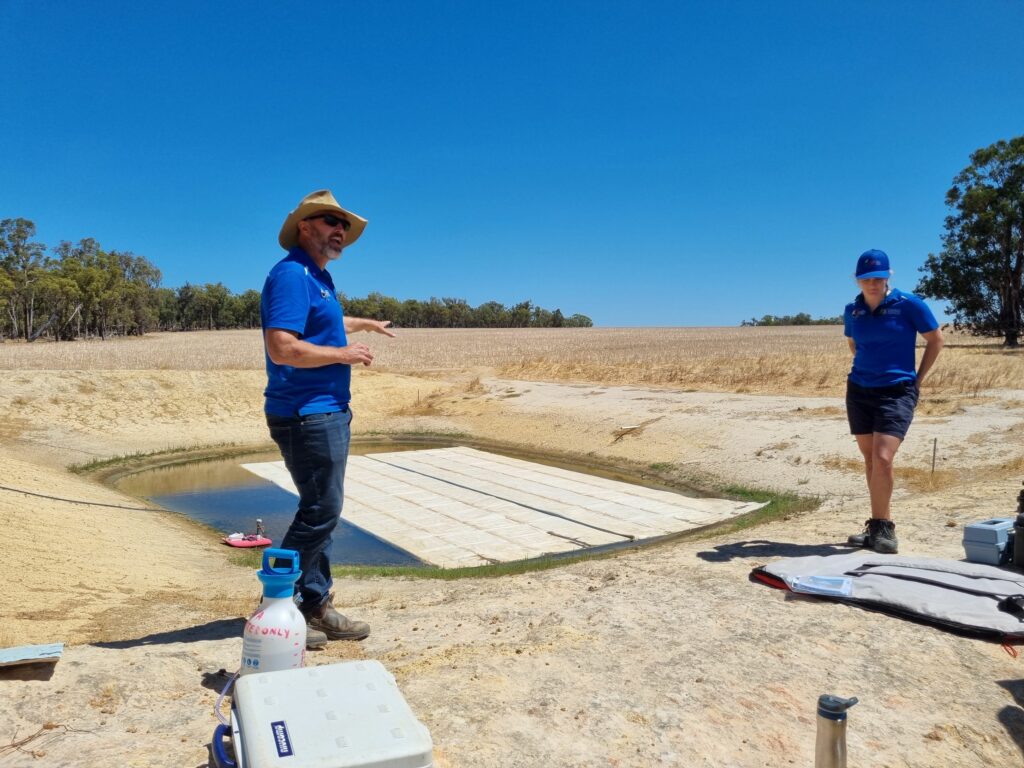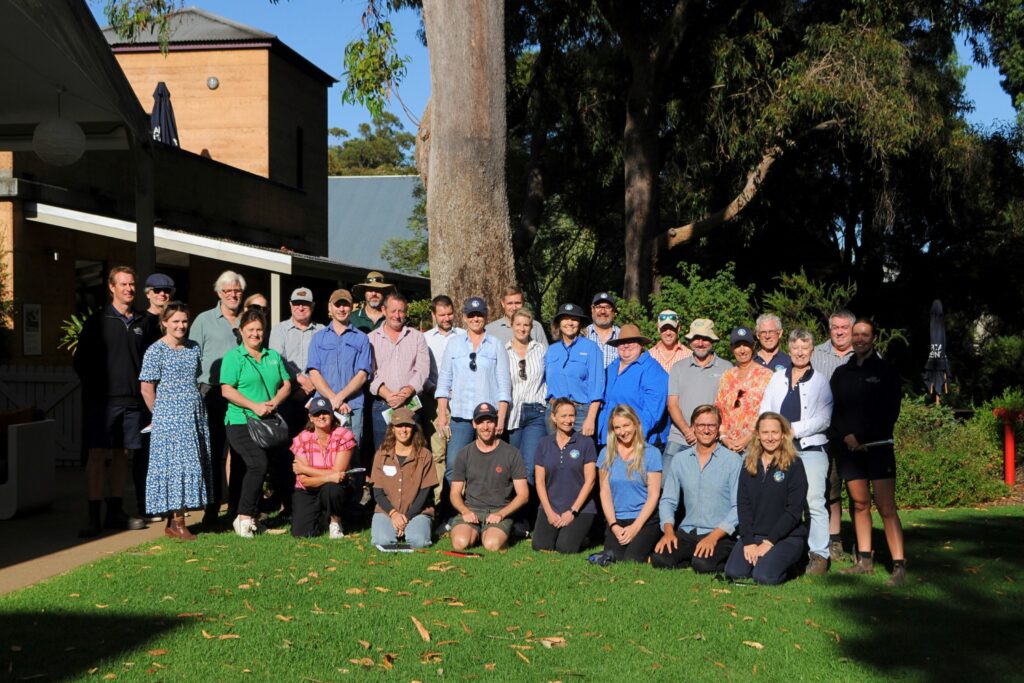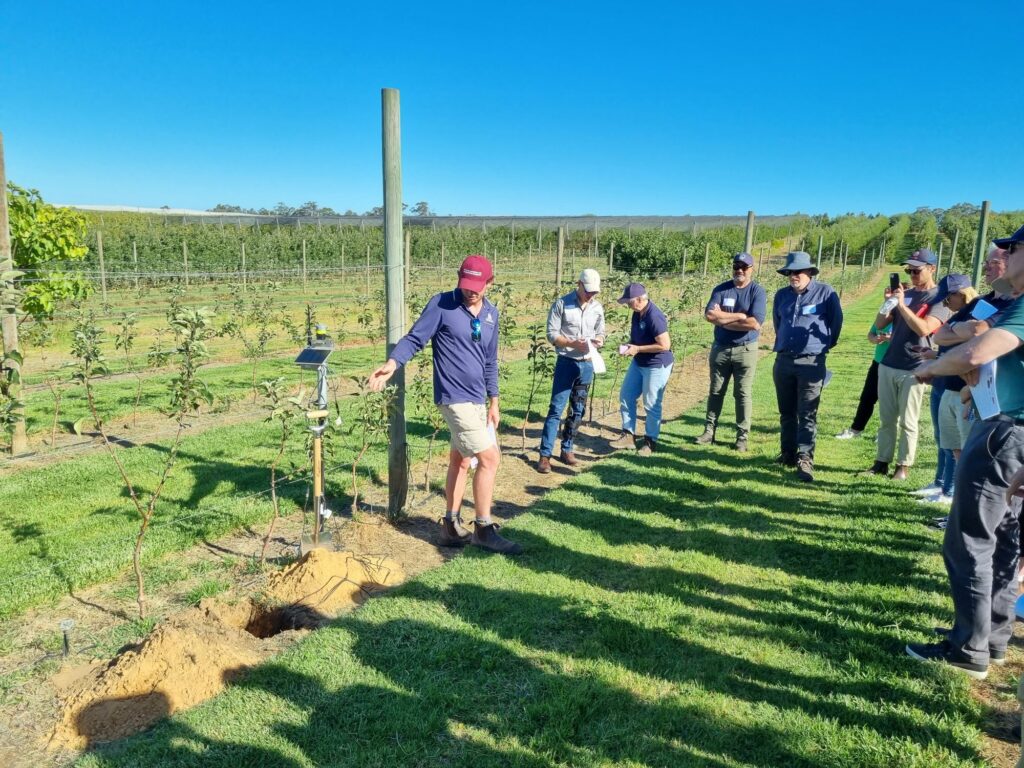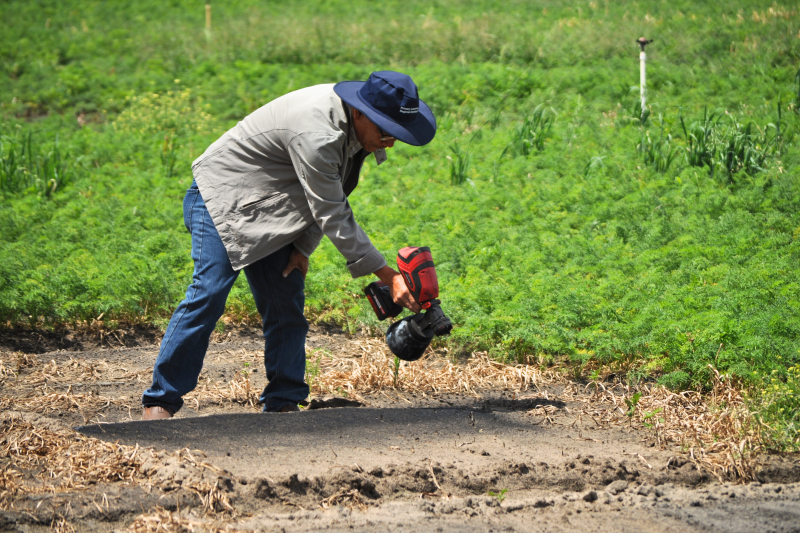A group of 22, including key staff from the other seven Drought Hubs and local and international evokeAG delegates, joined the South-West WA Drought Resilience Adoption and Innovation Hub (SW WA Hub) team on a two-day study tour through the Wheatbelt and South-West regions of Western Australia.
GGA Innovation Manager, Jo Wisdom, explained that the goal of the tour was to showcase some of the complexities and challenges around water management in the south-west of WA and how farmers are addressing these through innovative projects initiated by the SW WA Hub.
“The study tour was designed to highlight a diversity of solutions implemented in different farming systems to address the same challenges caused by a drying climate,” she said.
A highlight of the tour was a visit to a WaterSmart Dams site near Kojonup, where grower Wayde Robertson is hosting a trial of the Daisy Dam cover. This dam engineering solution is designed to reduce water evaporation. The WaterSmart Dams project, led by the Grower Group Alliance, aims to develop knowledge and water planning tools for farmers who need their dams to work in all years, and be able to make water investment decisions with confidence.

The group also visited an apple orchard in Manjimup, managed by Maurie and Anne Lyster, who are participating in the cross-Hub project, “Modern soil moisture monitoring for drought resilience”. Spearheaded by the Department of Primary Industries and Regional Development (DPIRD) in Western Australia, Northern Territory farmers in the North of Australia and Food and Fibre Gippsland in Victoria, this project sought to improve horticultural growers’ adoption rates of soil moisture monitoring technologies by providing a diverse set of equipment for trial purposes and an irrigation development officer to participating producers.
At Cape Mentelle, a Margaret River-based winery, tour participants gleaned insights into a project seeking to improve floor management for grape production in a warm and dry Mediterranean climate. Led by The University of Western Australia and funded by the SW WA Hub, this project aimed to demonstrate how winter cover crops may be dried into ‘green mulch’ in summer to alleviate drought challenges by covering bare soils without requiring further water resources.
At a carrot farm in Myalup, the group observed a demonstration of a biodegradable spray-on much designed by CSIRO to improve irrigation efficiencies, reduce herbicide and plastic use, and maintain healthy soils in horticultural systems. The key objective of this project was to support the profitability and sustainability of south-west WA horticultural producers by testing the sprayable mulch across multiple crops. This project also aimed to challenge traditional farming practices and foster a mindset open to innovative technologies in response to a drying and warming climate.
SW WA Hub Project Manager, Kellie-Jane (KJ) Pritchard, said the study tour was also an opportunity to strengthen the connections between Drought Hub staff from across Australia and gain deeper insights into the challenges they face and the synergies between them.
“Feedback from the participants highlighted the benefit of visiting project sites to see some of the innovative practices used by WA farmers in real world situations and hear about the impact of the projects from the growers themselves”, KJ said.
“The power of face-to-face conversations cannot be underestimated. The level of conversation and engagement from everyone showed how strong the Drought Hubs network is and how it can grow to be more collaborative for the benefit of producers across Australia in dealing with climate resilience.”
The eight Drought Resilience Adoption and Innovation Hubs are funded by the Australian Government’s $5 billion Future Drought Fund program, and aim to improve the drought resilience and preparedness of local farmers and their communities and foster agricultural innovation.
The study tour, subsidised by the DPIRD, was organised as a sideline event to the evokeAG conference in Perth on 20-21 February 2024. Organised by AgriFutures Australia, evokeAG connects the agrifood innovation community across the Asia Pacific region and around the world. The 2024 conference was AgriFutures’ biggest event so far, with a sold-out crowd of over 1,800 delegates.
The evokeAG conference and the study tour provided a unique platform for shared learning and collaboration between the eight Drought Hubs and key industry staff. Participants left with fresh ideas for potential joint projects aimed at developing sustainable solutions that can benefit Australian farmers across diverse climatic regions.



